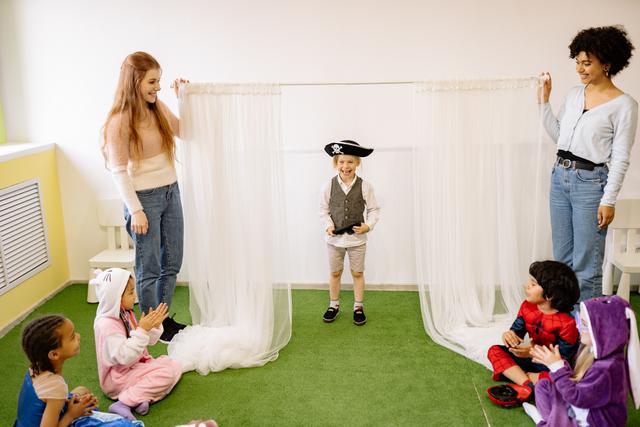Drama Articles
Drama For Kids In The UK
Drama in the UK for children offers a rich, engaging experience rooted deeply in a venerable tradition that dates back centuries. This area of performing arts not only sustains its classical and historical roots but continuously evolves, adapting to modern contexts and audiences. The development of drama in the UK commenced in ancient Greece, yet it was not until the Middle Ages that the UK began to forge its distinctive path in the dramatic arts. The middle ages introduced travelling theatre troupes, culminating in the establishment of London's permanent theatres by the late 16th century, marking a significant evolution in dramatic presentation and appreciation.
Among the myriad luminaries in the UK's dramatic history, William Shakespeare stands out as a pivotal figure whose body of work continues to influence and drive theatrical performances globally. The Elizabethan era, underpinned by Shakespeare's genius, witnessed the flourishing of professional theatre companies and the construction of iconic venues such as the Globe Theatre.
The subsequent centuries saw a structured formalisation of drama with the establishment of dedicated drama schools and societies. This period enriched the theatrical landscape significantly, broadening the scope and scale of productions. The 20th century heralded innovative drama movements such as the Theatre of the Absurd and experimental enactments originated by groups like the Royal Court Theatre, which introduced fresh narratives and unconventional methods to the stage.
Presently, drama remains an indispensable facet of the UK’s cultural fabric, celebrated for its diversity and dynamism. It plays a crucial role in educational frameworks, providing a platform for children to explore and engage with the arts actively. The myriad institutions, ranging from storied theatres to contemporary drama schools, provide a continuum of opportunities for young participants. This ensures that the tradition of UK drama not only perseveres but thrives, influencing new generations and contributing to the cultural richness of the society.
The Benefits of Drama
Drama not only unlocks the artistic potential in children but also brings substantial health benefits, pivotal for their physical and psychological well-being. Participation in drama activities enhances children's communication skills by providing them with the tools to express themselves both verbally and non-verbally, which can boost their confidence in social interactions and academic performances. Engaging in such creative expression also fosters emotional intelligence. As children navigate various roles and scenarios, they gain insights into different emotional landscapes, helping them to develop empathy and emotional resilience. These experiences allow children to better manage their emotions and understand those of others around them.
Moreover, drama promotes essential social skills by encouraging teamwork and collaboration. Through collective creative endeavours, children learn the importance of cooperation and develop skills in conflict resolution and peer interaction. This collaborative nature of drama is invaluable as it prepares children for diverse social settings and builds a foundation for interpersonal skills needed throughout life. Additionally, drama activities can indirectly enhance academic performance by improving literacy and language skills, critical thinking, and problem-solving abilities, proving that the benefits of engaging in drama extend far beyond the stage.
FAQs
1. What benefits does drama provide for children in the UK? Answer: Drama in the UK offers numerous benefits for children, enhancing their communication and social skills, boosting creativity, fostering emotional intelligence, and improving academic performance. Through participating in drama, children learn to express their ideas and emotions effectively, work collaboratively in teams, and develop a deeper understanding of human emotions and relationships.
2. At what age can children start participating in drama classes in the UK? Answer: Children can start participating in drama activities from a very young age. Many drama schools and community centres in the UK offer programmes specifically designed for toddlers, continuing through to teenagers, thus ensuring there's a suitable entry point for all ages.
3. How does drama participation influence academic performance among UK children? Answer: Engaging in drama has a positive impact on children’s academic performance, particularly in improving literacy and language skills. It also enhances their ability to think critically and solve problems creatively, which are valuable skills in educational settings and beyond.
4. Are there drama programmes in the UK tailored for children with special educational needs? Answer: Yes, the UK offers many drama programmes specifically designed for children with special educational needs. These programmes are tailored to provide a supportive and inclusive environment that encourages all children to participate and express themselves, thus aiding their overall development.
5. What should parents consider when choosing a drama programme for their child in the UK? Answer: Parents should look for drama programmes that are well-regarded for their inclusive and creative approach. Checking the qualifications of the instructors, the programme’s ethos regarding student engagement, and feedback from other parents are also important. It’s beneficial to choose a programme that not only focuses on performance skills but also on personal development and teamwork.









